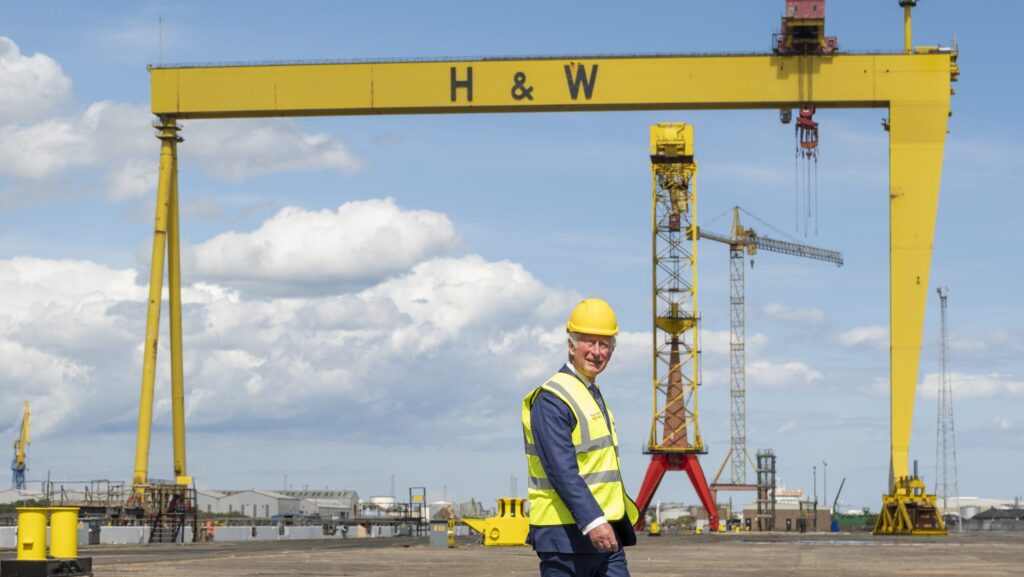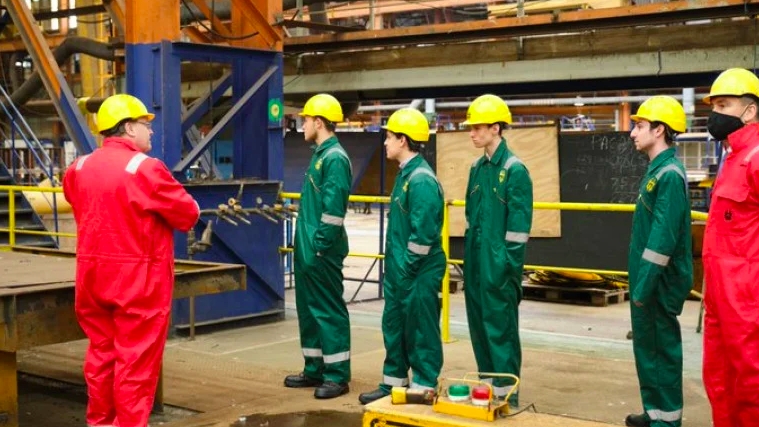Stricken UK boatbuilder Harland & Wolff in exclusive takeover talks
 King Charles III, the former Prince of Wales, paid a visit to Harland & Wolff in 2021. Image courtesy of David Cordner.
King Charles III, the former Prince of Wales, paid a visit to Harland & Wolff in 2021. Image courtesy of David Cordner.
Spanish shipbuilder Navantia is in exclusive negotiations to acquire Harland & Wolff, the company behind the Belfast shipyard that famously built the Titanic. The deal, expected to close in late November, would see Navantia take control of all four of Harland & Wolff’s yards—located in Belfast, Methil and Arnish in Scotland, and Appledore in Devon, England—potentially saving up to 1,000 jobs across the UK.
Harland & Wolff, which has been in administration since last month, entered financial difficulties when the Business Secretary, Jonathan Reynolds, refused to underwrite a £200m restructuring loan, citing concerns about potential taxpayer losses. Navantia has reportedly been providing temporary financial support to Harland & Wolff to maintain operations, including preparations for a key Royal Navy project.
Navantia and Harland & Wolff were jointly awarded a £1.6bn contract in 2022 to build three fleet solid support (FSS) ships for the Royal Fleet Auxiliary, the civilian branch of the Royal Navy. These ships are crucial for resupplying munitions and food to the Navy’s aircraft carriers. Harland & Wolff’s portion of the contract, worth around £700m, is seen as the company’s most valuable asset. However, the future of the project has been uncertain since Harland & Wolff was placed into administration.
Under the original plan for the FSS contract, Navantia and Harland & Wolff were to fabricate different sections of the ships at their respective Appledore and Cádiz yards, with final assembly taking place in Belfast. Despite the challenges, Navantia remains committed to delivering the contract and supporting the UK’s shipbuilding capacity.

Navantia’s acquisition is also seen as a way to protect both companies’ involvement in the FSS project. The potential deal with Navantia would not involve a pre-pack administration of the yards’ operating companies, thus reducing the immediate risk to jobs. While the main holding company is in administration, the four yards continue to trade, according to Harland & Wolff’s interim executive chair, Russell Downs, who stated: “The core activities of the group’s four yards continue to trade with support of all stakeholders and we will provide an update on our strategic process when it’s timely to do so.”
The details of the deal were first reported by the Sunday Telegraph on 13 October 2024. The paper’s sources suggest that while the deal is subject to ongoing negotiations, Navantia is likely to take control of the shipyards, enabling Harland & Wolff to resume its role in the FSS programme. A person familiar with the situation said Navantia had agreed to provide emergency cash to Harland “so that the shipyards can continue their operations while they explore options” for building the FSS ships.
The UK government has also played a role in encouraging Navantia’s interest in the acquisition, with reports suggesting that officials sought legal advice and tried to persuade the Spanish firm to bid for the four shipyards. Ministers have expressed concerns over delays to the FSS project but remain hopeful that the work will continue as planned. Reynolds had previously stated that he was confident Royal Navy ships would still be built in Belfast despite Harland & Wolff’s financial difficulties.
In addition to its naval projects, Harland & Wolff has a range of other assets, including a proposed gas storage operation in Northern Ireland and a now-scrapped ferry service to the Isles of Scilly. As many as 20 companies have expressed interest in buying parts of the business, but Navantia remains the primary bidder in the exclusive talks.

With the future of Harland & Wolff hanging in the balance, the acquisition by Navantia could secure the shipyards’ future and ensure the continuation of key defence contracts, including the vital FSS programme for the Royal Fleet Auxiliary.
A collapse of the shipbuilder could also cause strings of local businesses to suffer, with businesses also having to prepare for short-term cessations in new work from the yard or enter into arrangements for the satisfaction or reduction of outstanding debts owed to them.










